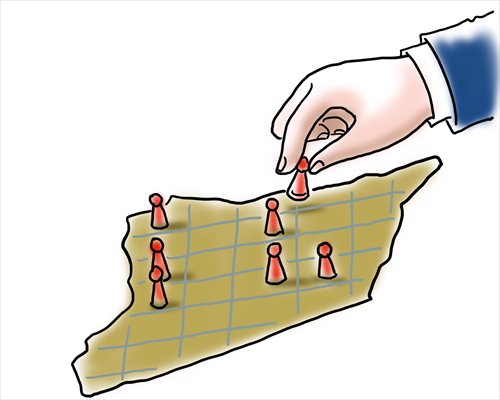Kremlin faces dilemma over future of Assad

Illustration: Shen Lan /GT
The Syrian civil war began with the conflicts between government forces and opposition factions in early 2011. The conflicts, which were just demonstrations initially, soon escalated into armed clashes. Following interventions from major powers, for instance, the US, the EU, Russia, Iran, Turkey and Saudi Arabia, the civil war has incessantly grown bitter. Each armed faction has gained control of some areas. Divided by the Islamic State (IS), the Bashar al-Assad regime and opposition forces, Syria today is a highly fragmented nation.
During this year's Munich Security Conference, the US and Russia clinched a Syrian cease-fire deal. All warring parties are required to stop hostile military action before Saturday. This is the first truce deal for Syria in its five-year-old civil war.
Washington and Moscow, as two significant external parties intervening in the Syrian civil war, are unable to dominate the situation in Damascus on their own. However, other involving forces, except IS, have to rely on the two powerhouses for support. Therefore, the US-Russia decision has a constraining effect on all sides of the civil war.
There is no urgent need for the Kremlin to intervene in the Syrian crisis, which does not relate to Moscow's core interests. By stepping into the crisis, the Kremlin aimed to back up the Assad regime and uphold his authority in Syrian affairs.
The Russians have already reached this goal. Although the Assad regime and the opposition still engage in a neck-and-neck game, the Western countries have totally failed in uprooting Assad. In fact, the effects of Moscow's intervention have been better than expected.
Russia, following its high-key intervention in Syria, is witnessing easing international pressure over the Ukrainian crisis. The West's attentions have been successfully diverted to the Middle East. There are also reports on the potential lift of economic sanctions against Russia.
The West has been sharply criticizing Russia for deliberately targeting the Syrian opposition factions. The opposition has suffered greatly from months of air raids. A truce deal is a must for opposition forces, which need time to recover.
However, the warring parties have to lodge applications to Russia as a precondition of cease-fire. This means they have to acknowledge the legitimacy of the Assad regime before taking part in future international negotiations.
The civil war was triggered by the disparities over the legal status of Assad's government. For the West, toppling Assad was previously a prerequisite to Syria's peace process.
Judging from the current situation, Russia has achieved part of its goals. At the beginning of this year, the US gave up its absolute opposition to the Assad regime, which will be reserved a place at future negotiations.
However, it is still too early to conjecture that Moscow has gained the upper hand in the multiple talks over the Syrian crisis. The Kremlin has to make a choice over the future of the Assad government. If it upholds the regime, the civil war will continue and the negotiations will end in futile. However, toppling Assad means the future Syrian government, no matter who leads it, will keep a distance from the Kremlin.
Assad has issued a decree recently, calling for a parliamentary elections on April 13. However, this only came days after he had vowed to retake "the whole of Syria" from armed rebels and jihadist groups. He immediately changed his attitude after the Russia-US truce deal. It is highly likely that Moscow has pressured Assad not to impede the reconciliation strategy.
Russia's domestic situation does not allow the Kremlin to put too much energy on Syria. Legislative elections will be held in Russia this year. Given the sanction-triggered economic downturn, the Kremlin, to reduce the fiscal deficit, has to cut budgets in the Far East and Crimea.
With rising inflation and decreasing wages, Russian citizens have started to be skeptical of Vladimir Putin's governance and his United Russia (UR) party.
The opposition is attempting to seize the opportunity to challenge UR's status as well. The Kremlin needs to put more efforts into domestic economy and elections, and thus the nation will see strategic contraction on foreign affairs.
Russia will not easily give up its achievements in Syria. However, given its limited strength, the Kremlin can hardly be as hardline as before. If regime change is unavoidable in Syria, it would be best for Russia if Assad's successor comes from the current government.
The author is a PhD candidate at the Center for Russian Studies, East China Normal University. opinion@globaltimes.com.cn